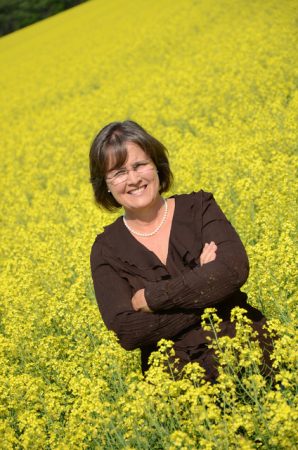One of the toughest challenges for young farmers is the uncertainty around what the plan is for the family farm in the future and how they fit into that plan. Farm transition planning brings certainty.
“Farm transition planning – also called succession planning – ensures farm business continuity: it is the only process that links one generation to future generations involved in the farm business and addresses how the vision, goals and dreams of the farm will carry on,” says Heather Watson, executive director of Farm Management Canada (FMC).
“According to the data just released for the 2016 Census of Agriculture, less than 10 per cent of Canada’s farmers have a succession plan, while we expect three out of four of Canada’s farms will change hands over the next 10 years. Agriculture will experience what farm family coach Elaine Froese calls ‘the tsunami of agriculture,’ whereby today’s farmers will transition not only their assets, but their managerial and leadership skills to the next generation.”
Challenges for young farmers
Froese, who has been working with farm families for almost 39 years, easily identifies many challenges that can crop up for young farmers in the farm transition process. She highlights a few examples.
During the farm transition planning process, family coach Elaine Froese helps families untangle what everybody wants, why they want it and when.
Photo courtesy of Kimage Photography.
“A lot of young people are very frustrated that they spend five, six, 11 years on the farm and nothing has been planned or put into an agreement. They feel like they are in what William Bridges [an authority on change and transition] called the ‘neutral zone.’ The neutral zone is the pain of not knowing. It’s a place of high anxiety and stress because you don’t know what the plan is or what the future holds.”
A serious problem in some families is that the senior generation doesn’t respect the skills of the next generation. For instance, Froese knows talented, knowledgeable young farm women whose fathers won’t recognize their abilities, so they end up leaving the family farm. “Patriarchy is alive and well in agriculture,” she says.
“Another challenge is when the younger generation is not getting compensated enough to allow them to build up a pool of disposable income that they can allocate toward debt servicing because obviously they can’t be gifted everything. And therein lies another tension: how much is gifted and how much is purchased through debt?”
Differing views on work-life balance can also create tensions that cloud the transition process. Froese gives an example: “I had a young farmer who would go in to read bedtime stories to his son and put him to bed. Even though he’d go back out, his father would get very angry with him for that. For young farmer men who are caught between pleasing their parents and trying to stay married, that is a huge challenge.”
Sibling conflicts can also tangle up transition planning. “[For instance,] with the huge value of land and assets in farming and the balance sheets having extra zeros on them, the greed factor rears its head. So you’ll have a farming child who wants to work with the business going forward, and then he or she discovers that the non-farming brothers and sisters feel like they need to get a quarter of the farm.”
And sometimes a young farmer’s biggest challenge is Grandpa. She says, “I have a family where the kids are leaving the farm because Grandpa is still holding on to the majority of the equity and wealth, and Dad at 56 still doesn’t even have it. These kids don’t see a hope of having the opportunity to grow in the future because Grandpa won’t transition the wealth.”
These types of issues need to be dealt with in the transition planning process through open, honest, transparent communication. “People have to recognize the emotional factors affecting planning,” Froese notes. “Once you have everybody calm and talking and able to have adult conversations and deal with the conflict, then you can actually make amazing decisions because everybody is feeling trusted and respected and heard.”
Tips for exiting the neutral zone
If you’re a young farmer tired of being in the neutral zone, it may be time to start taking action to move forward on transition planning.
Working through the transition planning process provides many ways to help create certainty. Froese explains, “You can create certainty with talking. You can create certainty with putting steps and timelines into place. You can create certainty with agreements – operating agreements, partnership agreements, shareholder agreements – there are all kinds of agreements at your disposal to help you create certainty and also give you a solid income.”
Learn more about transition planning
Even if your family isn’t ready to talk about transition planning, you can begin learning about it yourself. A great place to begin is FMC’s website, which has webinars, articles, videos, podcasts and many other resources about succession planning.
Learning about transition planning could help you begin conversations with other family members and to champion transition planning in your family.

The successor development program helped Kyle Norquay start having some solid conversations about farm transition planning with his father-in-law.
Photo courtesy of FMC.
Work on enhancing your farm skills
Most successful people are focused on continuous improvement and striving for excellence. You may already have many of the skills you need to eventually take over the farm, but there is always more you could learn. Work on filling any gaps in your knowledge and skills, and explore new areas that could lead to new opportunities for the farm.
This extra learning could give you more confidence in your own abilities and help you start the conversation on transition planning. And it could help your family see that you are committed to the successful management of the farm.
Start laying the foundations
If your family is ready to think about transition planning, then one way to begin the process is to participate in FMC’s Step Up to Succession program. It can help your family start laying the foundations for a smooth transition of farm knowledge, skills and assets.
The program has two components: succession and transition planning workshops for farm families, and the successor development program for young farmers. FMC is working with Froese and business management consultant Cedric MacLeod on Step Up to Succession.
Watson says, “During the workshops, parents and children come together for help with farm transition. It’s a safe space where they can talk about issues and learn how to start and continue the conversation using many of the great resources and tools out there.” She explains that the Nova Scotia Federation of Agriculture originated the concept for these workshops, and now with their blessing, FMC has incorporated the workshops into Step Up to Succession.
“The feedback from the workshops has been phenomenal,” notes Watson. For instance, participant Jim Pallister called the workshop “life-changing.”

From left to right: Bryce, Jim and William Pallister, beside a picture of five generations of Pallisters. The trio has started laying the foundation for their farm’s next transition plan.
Photo courtesy of Pallister Farm.
Young farmers from across Canada have applied to the Successor Development Program, an exciting learning and networking opportunity. The successful applicants are sponsored to attend a series of industry events focused on farm business management and they and their families attend a transition planning workshop.
“The participants learn valuable skills and information to take back to the family farm. And the parents, through participation in the transition planning workshops, are receptive to positive conversations and actions towards securing the future of farming in Canada,” Watson explains. “These young farmers are building a strong peer network that will continue as a mechanism to share insights and best practices for years to come. The bonds we have seen develop between workshop participants and between these young farmers are truly spectacular.”
Hannah Konschuh and Kyle Norquay, who were among the 10 successful applicants in the inaugural successor development program, both emphasize the great learning opportunities and amazing peer network they have gained through the program.
In addition to Step Up to Succession, every year FMC hosts a Bridging the Gap Forum at its annual Agricultural Excellence Conference. Watson says, “The forum’s goal is to provide a place for different generations of farmers and industry stakeholders to focus on what needs to happen within the agricultural industry to ensure a bright future for Canada’s future farmers.”
Consider getting help with your transition planning
A farm family coach can help your family with the sometimes difficult conversations around farm transition. Froese says, “You really need to get good communication happening first. That is what most families come to me for: untangling – figuring out what everybody wants and why and when.”
A coach can help get clarity on the goals, visions, values and timelines of each family member. These discussions will help the family work out how and when the transfer of ownership, management and responsibilities will occur.
Input from other advisors, like a financial planner, an accountant and a lawyer, can help you finalize your plan.
If you’re interested in hiring an advisor to help with your farm transition process, one place to look is the Canadian Association of Farm Advisors’ website, which lists many types of farm advisors, such as farm family coaches, accountants, lawyers, agrologists and more.
Starting the conservation
For Kyle Norquay, one of the great outcomes from FMC’s successor development program is that he is now able to have farm transition conversations with his father-in-law.
Norquay is part of a mixed grain farming operation near East Selkirk, Man., about 45 minutes northeast of Winnipeg. “We primarily grow canola, soybeans and wheat, and some timothy,” he says. “It’s a true family farm – pretty much everybody is involved in the farm in some capacity, whether it’s making meals or driving tractors or whatever. My father-in-law, his brothers, his wife and his mom are all part of the show, and then me. My wife also helps out on the farm, but her studies keep her pretty busy – she is just finishing her degree in physiotherapy.”
After getting his degree in agriculture a few years ago, Norquay worked as an agronomist, but he is now working full-time on the farm. “I teach jiu-jitsu and do some custom field work, but my primary job is the farm.”
One of the reasons Norquay decided to apply to the program was to learn more about farm management. Although he understands how to grow crops, he knew very little about farm management. “I didn’t grow up on a farm, and I had no farm experience until I started dating my now wife.”
The first event that he and the other program participants attended was the Agricultural Excellence Conference in November 2016, which focused on farm business management and intergenerational communication. In December, they went to Canada’s Outstanding Young Farmers’ national event. He says, “That event recognizes young farmers from all across Canada who are at the top of their field and doing unique things and really moving agriculture forward. So that was more about inspiration to do great things with your farm.”
In February, Norquay and his father-in-law attended FMC’s transition planning workshop in Manitoba. In late February, the program participants went to the Canadian Young Farmers’ Forum in Ottawa, which was a mix of inspiration and business management. The program’s final event will be the International Farm Management Congress this July in Edinburgh, Scotland.
The program has been very rewarding for Norquay. “Although every conference I’ve gone to has been packed with awesome information, I would say the peer network [of the 10 program participants] is top of mind for good things to come from the program. Every time we go to one of these conferences, we get together and talk about our farms, the challenges we’re facing and how we’re working through them, and different things we have learned, whether it is business management, succession planning, crop production.”
And the program has been key to starting transition conversations between Norquay and his father-in-law. “I have been helping on the farm for five or six years, and then I started working on the farm full-time a year and a half ago. But my father-in-law and I hadn’t really talked much about it. It was, ‘Well, okay, Kyle is coming back to work on the farm, and that obviously means something,’ but the conversations were always very vague,” he says.
“The transition workshop was the biggest thing to start some solid conversations between us. But going to the events about farm business management helped me feel a little bit more qualified to have some of the conversations. The program has given us the tools to get where we want to go.”
Norquay has a simple but essential piece of advice on transition planning for other young farmers: start the conversation. He says, “As soon as my father-in-law and I started talking about it, the reaction was, ‘It’s great that you’re showing interest.’ And it took off from there. So it was very unnecessary stress for me to be humming and hawing about what should I do, what should I say, is this too early, am I going to come off as an entitled little jerk?” His other suggestion to young farmers is to tap into the wide range of resources available to learn about farm transition planning.
Working toward a smooth transition
When Hannah Konschuh first heard about the Successor Development Program, she was immediately interested. “The program looked like it was designed specifically for a young farmer like me at this stage of the game,” she says. “The program’s focus on farm management and the succession planning process are key interests for me. My family and I had been talking about needing to access succession planning resources and it seemed like a perfect opportunity. Of course, another key aspect was that all expenses to attend the events were paid; for a young farmer that’s a major thing!”
Konschuh has a master’s degree and is an agrologist in training. About a year ago, she made the commitment to dedicate herself to the farm so she let go of her off-farm job with the Alberta Wheat Commission. She farms with her husband and her parents. The farm, which was started by her parents, is a dryland grain operation growing cereals, oilseeds and pulses, and is located about an hour and a half east of Calgary.
For Konschuh, the successor development program’s most important benefit is her new peer network of 10 keen young farmers. “They threw the 10 of us together at the first event, and we were an instant bunch of friends. Being able to meet other young farmers from across Canada was great. I think we’ll continue to be connected and resources for each other after the program is over.”
She adds, “I’ve also really enjoyed learning about the diversity of agriculture across Canada. The Canadian Young Farmers’ Forum showcased that really well. Another key thing has been learning about all the farm management events and resources that exist. We’ve been able to take in lots of experts in their respective fields. There are always new skills to learn and so many ways to keep improving your business.”
Konschuh and her family attended a transition planning workshop in February in Alberta. “It was awesome to attend this event together. This was the first time that all four of us had been to the same farm event. Usually only one person is able to attend and attempts to bring home the information and try to relay what they learned.”
The workshop was really helpful for her family. “We took home some specific skills, like actions to implement during farm meetings. We identified where resources are when we need them, as well as key things we needed to address that we hadn’t thought of. We learned that other farms have had similar challenges to ours, and more importantly we learned how to work through those challenges. The workshop allowed us to identify the steps and resources that we needed to create a plan, and since then we have actually put that plan in place and started it in motion.”
At the program’s final event, the International Farm Management Congress in July, Konschuh will be representing Canada as part of a farmer panel. She’ll be talking about grain farming in Canada and challenges that Canadian farmers face.
Konschuh has a couple of tips on transition planning for young farmers. “The first is to start the conversation early, and learn and practice the skills that you need to have that conversation. It’s typically going to be a long and challenging conversation, so you may as well get comfortable with it.” She suggests practicing things like how to conduct an effective meeting, how to get your point across, how to listen to each other and how to make sure everybody has an opportunity to speak and feels heard.
“The second thing is to access outside expertise where you need it – that could be a succession specialist or a financial or a tax planner, whoever that person may be – because a smooth transition is worth the investment.”
‘Give them certainty’
“I’ve been paying more attention to articles about transition planning lately. I turned 60 this year and you seem to look at things differently at 60. And both my sons are good, hard working, top-notch people to partner with. I want them to have certainty in their future as I wanted in mine when I was in my 20s,” says Jim Pallister.
He farms with his two sons in central Manitoba, near Portage la Prairie. The original homestead has been in the family for 120 years, and the farm is now one of the largest in Canada.
“I’m the fourth generation here. So my kids are the fifth, and their kids will be the sixth,” he says. “When I started, we were a small mixed farm with about 300 acres of crops and a couple of quarters of pasture and hay. Now we have 17,000 acres in crops. We don’t have livestock anymore, but we have the livestock work ethic with us.”
The Pallister family attended FMC’s transition planning workshop in Manitoba in February. For Pallister, there were two key take-home messages from the workshop.
“The first is to just do it. It’s like so many things in business, talking about it isn’t enough. You need to get started on planning. It may not be perfect but get something going. It’s a facet of your business that needs to be addressed.
“And the second is the importance of ongoing, honest communication. There should be nothing left undiscussed to fester.”
One of the helpful tools he learned about at the workshop was the talking stick concept. In a family meeting, the members pass around the talking stick – Froese uses a Beanie Baby – and the person holding it gets to talk without interruption. Pallister says, “No one dominates the meeting. Everyone takes their turn discussing the issue. Everyone has the chance to speak.”
Pallister has a simple piece of heartfelt advice on transition planning for farm families: “Agriculture is risky enough for young people. Give them certainty.”



 As part of the successor development program, Hannah Konschuh (in black) attended events about farm management and transition planning, including this Agricultural Excellence Conference.
As part of the successor development program, Hannah Konschuh (in black) attended events about farm management and transition planning, including this Agricultural Excellence Conference. 